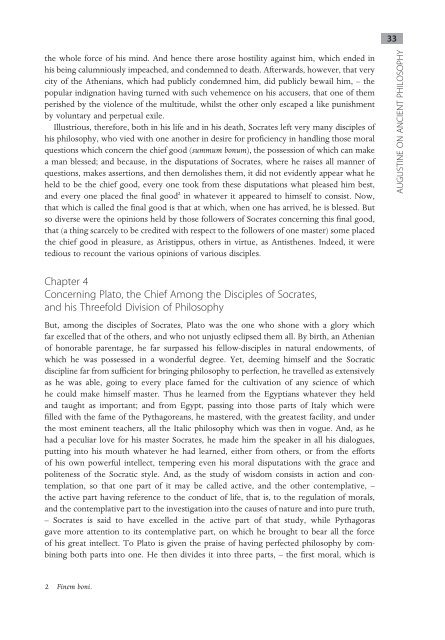Blackwell Readings in Medieval Philosophy - Fordham University ...
Blackwell Readings in Medieval Philosophy - Fordham University ...
Blackwell Readings in Medieval Philosophy - Fordham University ...
Create successful ePaper yourself
Turn your PDF publications into a flip-book with our unique Google optimized e-Paper software.
MP_C01.qxd 11/17/06 5:27 PM Page 33<br />
the whole force of his m<strong>in</strong>d. And hence there arose hostility aga<strong>in</strong>st him, which ended <strong>in</strong><br />
his be<strong>in</strong>g calumniously impeached, and condemned to death. Afterwards, however, that very<br />
city of the Athenians, which had publicly condemned him, did publicly bewail him, – the<br />
popular <strong>in</strong>dignation hav<strong>in</strong>g turned with such vehemence on his accusers, that one of them<br />
perished by the violence of the multitude, whilst the other only escaped a like punishment<br />
by voluntary and perpetual exile.<br />
Illustrious, therefore, both <strong>in</strong> his life and <strong>in</strong> his death, Socrates left very many disciples of<br />
his philosophy, who vied with one another <strong>in</strong> desire for proficiency <strong>in</strong> handl<strong>in</strong>g those moral<br />
questions which concern the chief good (summum bonum), the possession of which can make<br />
a man blessed; and because, <strong>in</strong> the disputations of Socrates, where he raises all manner of<br />
questions, makes assertions, and then demolishes them, it did not evidently appear what he<br />
held to be the chief good, every one took from these disputations what pleased him best,<br />
and every one placed the f<strong>in</strong>al good 2 <strong>in</strong> whatever it appeared to himself to consist. Now,<br />
that which is called the f<strong>in</strong>al good is that at which, when one has arrived, he is blessed. But<br />
so diverse were the op<strong>in</strong>ions held by those followers of Socrates concern<strong>in</strong>g this f<strong>in</strong>al good,<br />
that (a th<strong>in</strong>g scarcely to be credited with respect to the followers of one master) some placed<br />
the chief good <strong>in</strong> pleasure, as Aristippus, others <strong>in</strong> virtue, as Antisthenes. Indeed, it were<br />
tedious to recount the various op<strong>in</strong>ions of various disciples.<br />
Chapter 4<br />
Concern<strong>in</strong>g Plato, the Chief Among the Disciples of Socrates,<br />
and his Threefold Division of <strong>Philosophy</strong><br />
But, among the disciples of Socrates, Plato was the one who shone with a glory which<br />
far excelled that of the others, and who not unjustly eclipsed them all. By birth, an Athenian<br />
of honorable parentage, he far surpassed his fellow-disciples <strong>in</strong> natural endowments, of<br />
which he was possessed <strong>in</strong> a wonderful degree. Yet, deem<strong>in</strong>g himself and the Socratic<br />
discipl<strong>in</strong>e far from sufficient for br<strong>in</strong>g<strong>in</strong>g philosophy to perfection, he travelled as extensively<br />
as he was able, go<strong>in</strong>g to every place famed for the cultivation of any science of which<br />
he could make himself master. Thus he learned from the Egyptians whatever they held<br />
and taught as important; and from Egypt, pass<strong>in</strong>g <strong>in</strong>to those parts of Italy which were<br />
filled with the fame of the Pythagoreans, he mastered, with the greatest facility, and under<br />
the most em<strong>in</strong>ent teachers, all the Italic philosophy which was then <strong>in</strong> vogue. And, as he<br />
had a peculiar love for his master Socrates, he made him the speaker <strong>in</strong> all his dialogues,<br />
putt<strong>in</strong>g <strong>in</strong>to his mouth whatever he had learned, either from others, or from the efforts<br />
of his own powerful <strong>in</strong>tellect, temper<strong>in</strong>g even his moral disputations with the grace and<br />
politeness of the Socratic style. And, as the study of wisdom consists <strong>in</strong> action and contemplation,<br />
so that one part of it may be called active, and the other contemplative, –<br />
the active part hav<strong>in</strong>g reference to the conduct of life, that is, to the regulation of morals,<br />
and the contemplative part to the <strong>in</strong>vestigation <strong>in</strong>to the causes of nature and <strong>in</strong>to pure truth,<br />
– Socrates is said to have excelled <strong>in</strong> the active part of that study, while Pythagoras<br />
gave more attention to its contemplative part, on which he brought to bear all the force<br />
of his great <strong>in</strong>tellect. To Plato is given the praise of hav<strong>in</strong>g perfected philosophy by comb<strong>in</strong><strong>in</strong>g<br />
both parts <strong>in</strong>to one. He then divides it <strong>in</strong>to three parts, – the first moral, which is<br />
2 F<strong>in</strong>em boni.<br />
33<br />
AUGUSTINE ON ANCIENT PHILOSOPHY

















